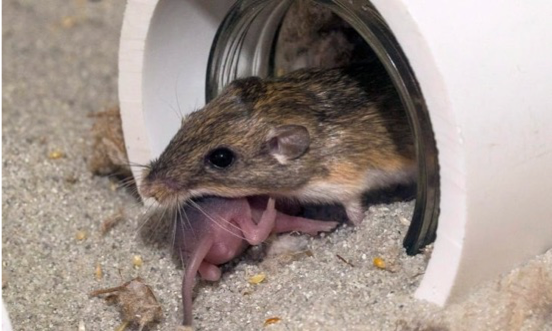Genome assembled for tiny mouse
- Aryn Wilder

- Feb 11, 2021
- 3 min read
Updated: Feb 12, 2021
Weighing about as much as six paper clips, the endangered Pacific pocket mouse (PPM) aka Perognathus longimembris pacificus is the among the smallest rodents in the world. It historically occupied a stretch of sandy soil habitat along the coast of southern California, playing a vital role in ecosystem function by dispersing seeds of native plants and promoting nutrient cycling in the soil through the digging of its burrows. Thought to be extinct for several decades, PPM was rediscovered in 1993 in three small, isolated populations, and emergency listed under the U.S. Endangered Species Act.
Photos provided by Aryn Wilder, San Diego Zoo ( © San Diego Zoo)
In 2012, the San Diego Zoo Wildlife Alliance, in cooperation with the U.S. Fish and Wildlife Service and the California Department of Fish and Wildlife, established a conservation breeding program with the goal of reintroducing PPM into unoccupied regions in their historic range. In addition to facilitating the return of the species to their native habitat, the breeding program also serves as a useful model for studying the role of genetic load in inbreeding depression, and the patterns and impacts of karyotypic differences that have been observed in this species. In this way, exploring the genomics of PPM will help to better design management strategies to help preserve genetic diversity in this and other endangered species.
Today, we share the chromosome-length assembly for the Pacific pocket mouse. Scientists at the San Diego Zoo Wildlife Alliance generated an initial assembly of the Pacific pocket mouse genome in collaboration with Dovetail Genomics, and the Hi-C experiments and upgrade as been done by DNA Zoo. The genome annotation and a paper describing this research is in progress, so stay tuned!
About DNA Zoo
DNA Zoo is a multinational consortium whose goal is to accelerate conservation efforts by rapidly disseminating the DNA sequences of many life forms, and improving the methods for reconstructing such sequences. DNA Zoo is committed to open-source release of data and methods; genome assemblies produced by DNA Zoo are available without restriction at DNAzoo.org. To date, DNA Zoo has released chromosome-length genome assemblies for over 3% of mammalian species.
About San Diego Zoo Global
Bringing species back from the brink of extinction is the goal of San Diego Zoo Global. As a leader in conservation, the work of San Diego Zoo Global includes on-site wildlife conservation efforts (representing both plants and animals) at the San Diego Zoo, San Diego Zoo Safari Park, and San Diego Zoo Institute for Conservation Research, as well as international field programs on six continents. The work of these entities is made accessible to over 1 billion people annually, reaching 150 countries via social media, our websites and the San Diego Zoo Kids network, in children’s hospitals in 12 countries. The work of San Diego Zoo Global is made possible with support from our incredible donors committed to saving species from the brink of extinction.
About Dovetail Genomics LLC
Dovetail Genomics LLC is the world leader in proximity ligation technology for genome assembly and epigenetic chromatin conformation profiling. To date, Dovetail has delivered over 1500 high quality, chromosome-scale genome assemblies, across hundreds of taxa and to hundreds of researchers globally. Dovetail provides a complete sample-to-publishable assembly workflow for de novo assembly of virtually any organism and also provides proximity ligation kits for DIY assembly. Dovetail also provides a suite of epigenetics kits and services, including Micro-C, HiChIP and Omni-C for epigenetic chromatin profiling.
















Comments